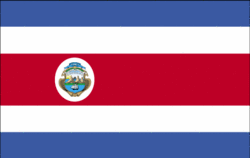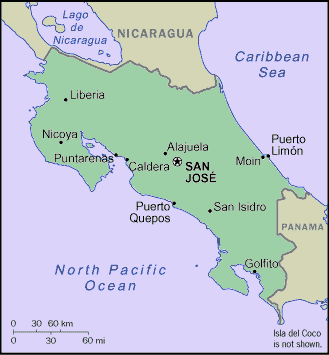Traveling Luck for Costa Rica. Costa Rica, North America
Costa Rica is located in Central America, bordering both the Caribbean Sea and the North Pacific Ocean, between Nicaragua and Panama.
Land in Costa Rica is coastal plains separated by rugged mountains including over 100 volcanic cones, of which several are major volcanoes.
Costa Rican land covers an area of 51100 square kilometers which is slightly smaller than West Virginia
Costa Rica has borders with Nicaragua for 309km and Panama for 330km.
 Costa Rican national flag (Flag of Costa Rica)
Costa Rican national flag (Flag of Costa Rica)
As for the Costa Rican climate; tropical and subtropical; dry season (December to April); rainy season (May to November); cooler in highlands.
Costa Rican(s) speak Spanish (official), English.
Places of note in Costa Rica
- San José
- Puerto Limón
- San Francisco
- Alajuela
- Liberia
- Paraíso
- Puntarenas
- San Isidro
- Curridabat
- San Vicente
- San José
- Purral
- Turrialba
- San Miguel
- San Pedro
- San Rafael Abajo
- Quesada
- Ipís
- Cartago
- Chacarita
- San Juan
- Mercedes
- Guadalupe
- Aserrí
- San Rafael
- San Felipe
- Patarrá
- Tejar
- Heredia
- San Pablo
- Calle Blancos
- Cañas
- Guápiles
- Siquirres
- San Rafael
 Costa Rican map
Costa Rican map
Regions of Costa Rica
Costa Rica is a Central American success story: since the late 19th century, only two brief periods of violence have marred its democratic development. Although it still maintains a large agricultural sector, Costa Rica has expanded its economy to include strong technology and tourism industries. The standard of living is relatively high. Land ownership is widespread.
Costa Rica's basically stable economy depends on tourism, agriculture, and electronics exports. Poverty has been substantially reduced over the past 15 years, and a strong social safety net has been put into place. Foreign investors remain attracted by the country's political stability and high education levels, and tourism continues to bring in foreign exchange. Low prices for coffee and bananas have hurt the agricultural sector. The government continues to grapple with its large internal and external deficits and sizable internal debt. The reduction of inflation remains a difficult problem because of rises in the price of imports, labor market rigidities, and fiscal deficits. The country also needs to reform its tax system and its pattern of public expenditure. Costa Rica is the only signatory to the US-Central American Free Trade Agreement (CAFTA) that has not ratified it. CAFTA implementation would result in economic reforms and an improved investment climate.
Costa Rican natural resources include hydropower
four volcanoes, two of them active, rise near the capital of San Jose in the center of the country; one of the volcanoes, Irazu, erupted destructively in 1963-65
Costa Rican religion is Roman Catholic 76.3%, Evangelical 13.7%, Jehovah's Witnesses 1.3%, other Protestant 0.7%, other 4.8%, none 3.2%.
Natural hazards in Costa Rica include occasional earthquakes, hurricanes along Atlantic coast; frequent flooding of lowlands at onset of rainy season and landslides; active volcanoes.
Travel Advice for Costa Rica
Costa RicaSUMMARY
- Around 18,000 British nationals visit Costa Rica every year. Most visits are trouble-free. The main type of incident for which British nationals require consular assistance in Costa Rica is to replace stolen passports and travel documents.
- Incidents of violent crime against tourists are increasing.
- The threat from terrorism is low but you should be aware of the global risk of indiscriminate terrorist attacks, which could be against civilian targets, including places frequented by foreigners.
- The rainy season in Costa Rica normally runs from May to November, coinciding with the hurricane season in the Caribbean. Please see the Natural Disasters section of this Travel Advice for more information.
- We strongly recommend that you obtain comprehensive travel and medical insurance before travelling. You should check for any exclusions, and that your policy covers you for the activities you want to undertake. Please see: Travel Insurance
SAFETY AND SECURITY
There has been an increase in crime against tourists over the past few years in Costa Rica. Opportunistic theft of personal belongings, passports and travel documents is the main problem. However, there has also been an increase in incidents of violent crime against tourists. Gang muggings and armed robberies can occur even in daylight on busy streets.
- Do not wear jewellery or carry large amounts of cash. Avoid street moneychangers. And avoid stopping in poorly lit or low-populated areas to make telephone calls or seek directions.
- Watch your belongings carefully at all times and in all places.
- Be particularly careful of your belongings when staying in hostels and hotels. It is important that you lock valuable belongings, passports and travel documents in hotel safes where possible. You should only leave your belongings in a safe for which you retain control of the key. Keep the key on your person.
- You should be vigilant when using buses. Theft of bags from overhead compartments inside buses is a common problem and efficiently carried out. Thieves have simple but effective ways of distracting a target.
- Be particularly watchful of your valuables at the beach and in popular tourist destinations.
- Avoid leaving unattended drinks in bars and places of entertainment. There have been reports of "spiked" drinks resulting in assault and theft.
- Only take official taxis. Avoid using unofficial taxis – ‘taxi piratas’ - as several violent incidents involving tourists have been reported. Official taxis are red with a triangular sticker and plastic box on the roof with the name and number of the taxi company. Where possible use radio-dispatched taxis. When getting into a taxi, ensure that the driver's identification number, name and photograph are clearly visible on the dashboard, and ensure that the driver indicates the meter.
Political Situation
Costa Rica Country Profile.
Local Travel
If you are visiting jungle areas you should be accompanied by experienced local guides.
Road Safety
Road conditions are generally good on main routes, although potholes caused by heavy rains in the wet season are common. Landslides in the wet season, which block the road between San José and Guapiles on the way to Limón are frequent and can cause delays. However, they are cleared away quickly and there are longer alternative routes. Drivers should be cautious when approaching bridges as these are often only one-way, even if the road is two-way. Accidents in Costa Rica are usually caused by speeding or overtaking irresponsibly. The standard of driving is lower than in the UK. You should resist temptation to overtake without clear visibility and adhere to speed limits, as traffic police are strict. If you have a collision when driving a car you must not move the vehicle, not even to the side of the road, until the traffic police have come to inspect it. The Traffic Police (Transito) and the Insurance Investigator (INS) must come to the scene of the accident to complete accident reports.
However, you should be aware that there have been instances of deliberate traffic accidents as a means of stopping vehicles in Costa Rica, with the intention of committing robberies or other crimes against the victims. If you have reason to suspect that the collision was a deliberate act by another driver to make you stop, you might decide it would be safer to drive on until you reach a place e.g a police station or a garage where it would be safer to stop. In such circumstances it is essential that you are ready to explain your actions to the traffic authorities mentioned above.
Sea and River Safety
You should take special care when swimming from all beaches in Costa Rica but especially on the Atlantic coast. Rip tides are very common. There are normally no lifeguards. You should seek reliable local advice.
Safety features on small boats are not always of a good standard. If you plan white water rafting, you should arrange this with an established company.
Fire Service – 911 or 118
LOCAL LAWS AND CUSTOMS
ENTRY REQUIREMENTS
Under Costa Rican law, children under the age of 18 born in Costa Rica are automatically considered to be Costa Rican citizens, even if travelling on a British passport. Notarised written consent from both parents, or Costa Rican passport, is required in order to leave Costa Rica. The nearest Costa Rican Embassy or Consulate should be contacted for further information on laws regarding the international travel of Costa Rican children.
Prospective residents should make applications in their country of residence as it is no longer possible to apply in Costa Rica although, having applied, you may enter the country and stay for three month periods until the procedure is finalised.
HEALTH
Only emergency medical treatment is available without charge for visitors.
You should seek medical advice before travelling and ensure that all appropriate vaccinations are up-to-date. For further information on health, check the Department of Health’s website at: www.dh.gov.uk
NATURAL DISASTERS
Hurricanes
GENERAL

 Search
Search Costa Rica country profile
Costa Rica country profile Travel advice for Costa Rica
Travel advice for Costa Rica